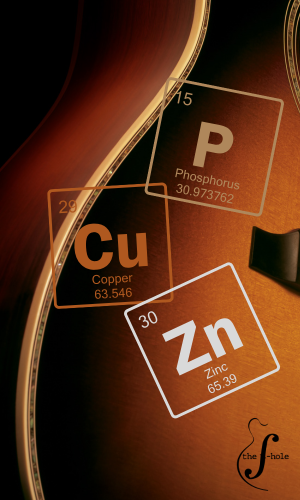When it comes to acoustic guitar strings, musicians often find themselves caught between the scintillating sound of 80/20 bronze and the earthy tones of phosphor bronze. Each type brings its unique characteristics, catering to different playing styles and sonic preferences. In this article, we’ll explore the differences between 80/20 bronze and phosphor bronze strings, helping you make an informed decision for your next string change.
What Are Acoustic Guitar Strings Made Of?
Acoustic guitar strings are made of metal alloys, and the choice of metal can profoundly influence the sound and playability of the instrument. The most common materials used for windings are bronze and its variations. Others include nickel, silver and even gold.
 80/20 Bronze Strings
80/20 Bronze Strings
80/20 bronze strings, also known as brass strings, consist of 80% copper and 20% zinc. This combination yields a bright, crisp sound that’s popular among bluegrass and folk musicians. Key Characteristics of 80/20 Bronze Strings:
- Bright Tone: The copper content gives these strings a clear and articulate tonality, suitable for fingerpicking and strumming.
- Quick Break-in Period: Players often report that these strings come to life quickly, allowing for immediate playability.
- Shorter Lifespan: One downside to 80/20 bronze is that they tend to lose their brightness faster than phosphor bronze strings, as they are more susceptible to corrosion and wear.
Phosphor Bronze Strings
Phosphor bronze strings add a small amount of phosphorus to the 80/20 bronze mix, creating a unique alloy that offers a warmer sound. Key Characteristics of Phosphor Bronze Strings:
- Warm Sound: The phosphor content provides a more complex and earthy tone, making these strings suitable for various musical genres, including rock, country, and singer-songwriter styles.
- Longer Durability: These strings generally resist corrosion better than their 80/20 counterparts, resulting in a longer lifespan and maintaining their tonal quality for more extended periods.
- Rich Overtones: The warmer tones of phosphor bronze strings enhance the harmonic overtones, adding depth and richness to the overall sound.
Making the Choice
Choosing between 80/20 bronze and phosphor bronze strings ultimately comes down to personal preference and the sound you’re trying to achieve.
- If You Prefer Brightness: Opt for 80/20 bronze if you love a bright, cutting tone that shines through in ensemble settings or when performing live.
- For Warmth and Depth: Phosphor Bronze may be the better choice if you're looking for a more mellow sound that pairs well with fingerpicking or solo performances.
Conclusion
Both 80/20 bronze and phosphor bronze strings have their place in the world of acoustic guitar music, each providing unique tonal qualities and playability. Experimenting with different string types can enrich your playing experience and help you discover the sound that best fits your musical style. So, the next time you feel the need for a string change, consider whether you want the bright attack of 80/20 bronze or the lush warmth of phosphor bronze. Happy strumming!






